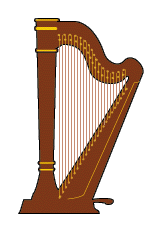


Hesperion XXI Leaps Centuries, Borders
Allan
Ulrich, Chronicle Music Critic
Monday, March 19, 2001
©2001 San Francisco Chronicle
URL: http://www.sfgate.com/cgi-bin/article.cgi?file=/chronicle/archive/2001/03/19/DD184521.DTL
There may be a few greater early music experiences than Spain's eight- member Hesperion XXI, but there are none that go about advertising their greatness so quietly. Back in the East Bay for the first time since 1998, Jordi Savall's captivating team made the most of its uniquely delicate magic Friday evening in Berkeley's First Congregational Church.
Given the laws of acoustics, the sheer modesty of the sonic output should have posed problems. If sponsoring Cal Performances were to book Hesperion XXI (as in 21st century) into the intimate hall this group should inhabit, they probably wouldn't reap enough revenue to pay for Savall's taxi fare from the airport. Yet, as on previous visits, Friday's capacity audience sat in rapt attention, riveted by the slightest sound as these Barcelona-based artists delved into a fabulous musical past, leaping centuries with a single strum of the psaltery.
The program, like most that preceded it in previous engagements, bore a title: "Diaspora Sefardi." It carried a subtitle: "From Medieval Spain to the Eastern Mediterranean." And it also came with a sub-subtitle: "The Roots and the Cultural Richness of the Judeo-Spanish Oral Tradition."
MULTICULTURAL FERMENT
That baggage may have looked daunting, but it sounded wonderfully evanescent and supremely infectious. It helped that Friday's fare traversed a genuinely fascinating era of multicultural ferment. When the Sephardic Jews were expelled from Spain in 1492, they relocated first to Portugal and then fanned out across Eastern Europe and North Africa.Their music assumed the coloring, the modes and the language of the host nations, yielding a truly unique legacy. In the Judeo-Spanish songs, one encounters Greek and Arabic words as well as archaic forms of pure Spanish. And the instrumentation on Friday's concert also crossed conventional borders; it came as a surprise to find an oud and a sarod (which we associate with classical Indian music) tossed in with the lira and vielle.
Savall, whose viola da gamba playing on the soundtrack of the movie "Tous les Matins du Monde" made him an early music idol a decade ago, this time abandoned his large instrument for smaller fiddles, from which he drew focused and earthy sounds. The complement of players also included soprano Montserrat Figueras; the terrific percussionist Pedro Estevan; Pedro Memelsdorff, flutes; Yair Dalal, oud; Kenneth Zuckerman, lute and sarod; Arianna Savall, medieval harps; and Begona Olavide, psaltery.
A BEDOUIN LAMENT
The program, inspired in part but a bit diffuse as the evening wore on, began with a stroke of imaginative reconstruction as, to a slow, offstage drumbeat, Figueras and Memelsdorff entered and mounted matching towers on the platform. To the muffled sound of an offstage drum, she sang a Bedouin lament and he accompanied with muted passion.From this starting point in Morocco, Savall and his colleagues journeyed around the Mediterranean. They made stops in Andalusia, Castello, Rhodes, Algiers, Turkey, Sarajevo, Sofia, Galicia and Jerusalem.
Figueras sang of thwarted love ("El moro de Antequera," "La Guirnalda de Rosas"), of miracles of the Virgin ("Pero que seja a gente"), of children falling to sleep ("Nani, nani"). Hers is a special gift, and her voice, perhaps not conventionally beautiful, slinks around the scale in a haunting melisma, radiating hues of astonishing potency. If only, as has been noted in previous encounters, Figueras projected the poetry rather than eliding consonants.
The sequencing remained Savall's secret (a recent disc on the AliaVox label contains much of Friday's material). Improvisations proliferated; a gentle lute and lyra duet was adorned with a soft whoosh on the drum, suggesting the sound of distant thunder. A tangy cantiga by the music-loving monarch, Alfonso el Sabio, exulted in a primal rhythmic accompaniment.
This was a veritable king's ransom of musical discovery; and when Zuckerman launched a duet with Estevan, the sarod and percussion reaffirmed a shining truth -- music dissolves national borders in a way that treaties cannot.
E-mail Allan Ulrich at aulrich@sfchronicle.com.
©2001 San Francisco Chronicle